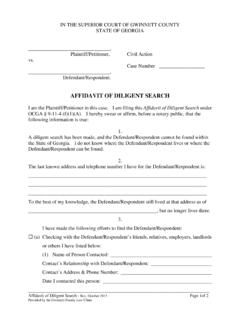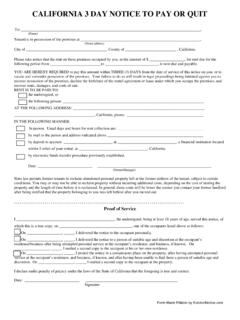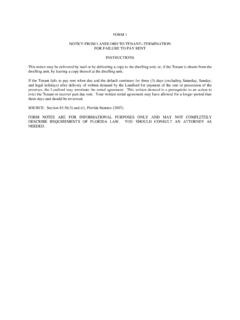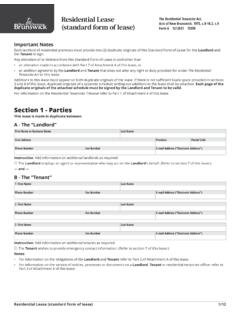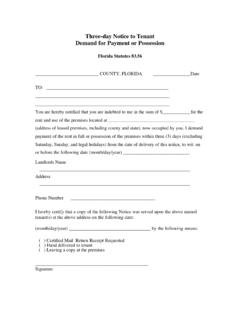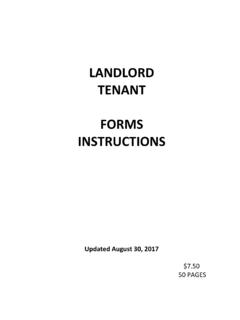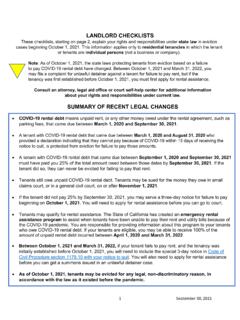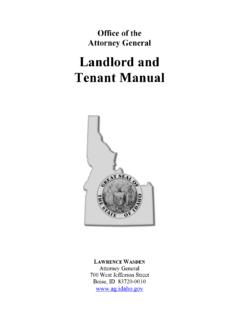Transcription of The Dispossessory Process How to File and How to Answer
1 1 The Dispossessory ProcessHow to File and How to AnswerWhen Can a Landlord Remove a tenant ?If a Landlord wants a tenant to move out of rental property and the tenant will notvoluntarily move, the landlord must go to court and seek an order permitting the tenant to beremoved from the property. Once the terms of the lease have been followed, Georgia lawrequires the landlord to demand or request that the tenant immediately give up possession andvacate. This demand is best made in writing. If the tenant refuses or fails to give up possession,the landlord can file a Dispossessory the legal Process can take several weeks, self help evictions, including changing thelocks or threatening the tenant , are illegal under Georgia law.
2 A landlord who suspends atenant's utility service prior to the final judgment in a Dispossessory action has broken the lawand may be subject to a fine up to $500 under Georgia Law found at Atenant can take legal action against the landlord for damages suffered due to a wrongful self-help eviction. If the tenant cannot obtain an attorney, the claim can be filed in the magistratecourt of the county where the landlord is located or as a counterclaim in the Dispossessory actionbrought by the landlord. How Does the Landlord Ask the Court for an Eviction Order?
3 The landlord can seek an order from either the Magistrate, State, or Superior Courtlocated in the county where the rental property is located. In the warrant the landlord canrequest possession of the rental property and money for any unpaid rent. The landlord can alsorequest that the court require the tenant to pay the cost of filing and serving the Will the tenant Receive Notice of the Legal Action?The sheriff, his deputy, or any lawful constable of the county will serve the tenant withthe affidavit. The sheriff must attempt to personally serve the defendant by delivery to anycompetent adult person residing on the premises not just visiting.
4 If no one is found residing onthe premises, the sheriff can serve the tenant by posting a copy of the summons and the affidaviton the door of the premises and, on the same day of such posting, mailing a copy of the summonsand the affidavit to the defendant at his last known address. This is called tack and mail of Tack and Mail Service: A Dispossessory warranttaken due to nonpayment will usually request possession and ajudgment for the amount of rent owed. If the Dispossessory warrantis served by "tack and mail" service, a copy being placed on thedoor and a second copy sent by mail, the court cannot issue amoney judgment.
5 However, if the tenant served by tack and mailfiles an Answer , the court can award a money Does the tenant Respond?A tenant served with a Dispossessory can file an Answer with the court. The tenant mustanswer either orally or in writing within seven days from the date of actual service unless theseventh day is a Saturday, a Sunday, or a legal holiday, in which case the Answer may be madeon the next day which is not a Saturday, a Sunday, or a legal holiday. The tenant should file awritten Answer stating why the landlord does not have the right to remove them from theproperty.
6 If the tenant cannot write, the Answer can be made orally, written down by the clerkand signed by the tenant . The Answer may contain any legal or equitable defense or other claimsthat the tenant may have against the landlord, including claims for damages due to the landlord sfailure to repair. If an Answer is filed, the court will schedule a hearing in which the tenant andlandlord can each present their the tenant Stay on the Property While Waiting for the Hearing Date?If the tenant files an Answer , the landlord can request that the tenant be required to payall future rent due into the registry of the court until the hearing.
7 In most counties in Georgia,the court will not automatically require payment of rent into court, the landlord must file amotion asking the court to require payment of rent into the court. If the court does orderpayment, the tenant must make the payments to remain in possession while waiting for If the tenant Does Not File an Answer ?When a tenant has been served with the Dispossessory action and does not Answer , thetenant has waived the right to challenge their landlord s claims against them. This means theyhave lost their day in court and a default judgment will be entered against them and they canbe force to move immediately after the order is signed by the You Filed an Answer But Lost At Your Magistrate Court Trial If you lost your Dispossessory trial in magistrate court, the judge will issue an order foryou to be removed from the property (called a writ of possession).
8 The judge may also hold thatyou owe your landlord money for rent and/or other charges. You have seven (7) days from thedate of the judgment (usually the day of your hearing) to file your appeal. You can check withthe court to find out when your appeal must be filed. If you do not file an appeal, your landlordcan use the writ of possession and have you removed from his property no earlier than the eighth(8) day following your trial. If the judge put in his order that you owe your landlord money,thyour landlord may try to collect that money by garnishing your paycheck, back accounts orproperty.
9 The landlord may also use a collection agency to try and collect the money from There Any Appeal?After the court issues its decision after the hearing, either party may appeal but must doso within seven days of the judgment. The law now requires that if you wish to continue living3in the rental property while you appeal, you must pay to the court at the time you file yourappeal any rent the lower court ordered you to pay the landlord. You will also have to pay thecourt to file your appeal. You can ask the court for a paupers affidavit, if you can not afford topay the court costs.
10 If you want to continue living in the rental property while your appeal ispending, you will have to pay your monthly rent into court each month as it becomes due. If youfail to pay the rent into court each month, the court will allow the landlord to remove you fromthe property. Be aware that superior and state courts are more complicated than magistratecourt and you may need the assistance of an attorney to be Protections Are There for Tenants?A tenant whose landlord has filed a Dispossessory affidavit because of nonpayment of rentmay be able to avoid being evicted by paying all that the landlord alleges is due plus the courtcosts.

